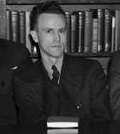Edward Buehrig
Edward Henry Buehrig (October 4, 1910 – August 31, 1986) was an American political scientist who spent most of his career at the Indiana University Bloomington. He was known as a leading authority on the foreign policy of Woodrow Wilson.
Edward Buehrig | |
|---|---|
 Buehrig pictured in 1940 | |
| Born | October 4, 1910 Minier, Illinois, United States |
| Died | August 31, 1986 (aged 75) Bloomington, Indiana, United States |
| Nationality | American |
| Occupation | Professor |
| Academic work | |
| Discipline | Political science |
| Sub-discipline | International relations |
| Institutions | Indiana University Bloomington |
| Main interests | Wilsonianism |
Early life and education
Buehrig was born in Minier, Illinois, and attended Illinois State University where he served as an editor of the Vidette student newspaper.[1][2] He subsequently transferred to the University of Chicago, from which he graduated. Buehrig went on to receive a M.A. in International relations, also from Chicago, with a thesis titled "Why the United States took the Philippines Islands", and later earned a Ph.D. from the same institution with his dissertation, "American Intervention in Europe, 1917".[3][1][4]
Career
In 1934 Buehrig began teaching at Indiana University, where he would remain – except for three, short interludes – until his retirement in 1981. During World War II Buehrig worked in the United States Department of State and served as Secretary-General of the Italo-Yugoslav Boundary Commission;[1][5] after the war he again departed Indiana to spend a year at Princeton University researching the foreign policy of Woodrow Wilson. A third hiatus came in 1957 when he spent one year teaching at the American University of Beirut (AUB).[1] According to Elsa Marston, she met her husband Iliya Harik at an AUB lecture given by Buehrig.[6]
Buehrig served as acting president of the Midwest Political Science Association during 1955.[7] On being appointed chair of the political science department at Indiana in 1980, Elinor Ostrom recalled that she "realized that Professor Buehrig would be retiring within a year [and] I shuddered to think of all the memory and insight about the Department that might be lost to future generations". At Ostrom's request, Buehrig wrote "Political Science at Indiana: An Historical Essay", chronicling the history of the department up to that point.[8]
In May 1986, three months before his death, Illinois State University awarded Buehrig an honorary degree.[9]
Selected publications
- Buehrig, E (1950). "Wilson's Neutrality Re-Examined". World Politics, Vol. 3, No. 1, pp. 1–19
- Buehrig, E (1950). "The United States, the United Nations and Bi-Polar Politics". International Organization, Vol. 4, No. 4, pp. 573–584
- Buehrig, E (1955) Woodrow Wilson and the Balance of Power Bloomington: Indiana University Press.
- Buehrig, E (1957) Wilson's Foreign Policy in Perspective Bloomington: Indiana University Press.
- Buehrig, E (1965). "The International Pattern of Authority". World Politics, Vol. 17, No. 3, pp. 369–385
- Buehrig, E (1966) Essays in Political Science Bloomington: Indiana University Press.
- Buehrig, E (1986) The Perversity of Politics Dover, N.H.: Croom Helm.
References
- "Edward H. Buehrig papers, 1945–1984, bulk 1960–1968". indiana.edu. Indiana University. Retrieved 9 July 2016.
- "Past Editors of the Vidette". videtteonline.com. Illinois State University Vidette. Retrieved 9 July 2016.
- "Why the United States took the Philippine Islands". worldcat.org. OCLC. Retrieved 9 July 2016.
- "American intervention in Europe, 1917 ... by Edward H. Buehrig ..." lib.uchicago.edu. University of Chicago. Retrieved 9 July 2016.
- Military History Network: "Settling the question of Trieste"
- Marston Harik, Elsa (Summer 2013). "My Fifty Years with Iliya". Journal of New Media Studies (2).
- "Past MPSA Officers". mpsanet.org. Midwest Political Science Association. Archived from the original on 8 March 2014. Retrieved 9 July 2016.
- "Political Science at Indiana: An Historical Essay". indiana.edu. Indiana University Bloomington. Retrieved 9 July 2016.
- "Edward Buehrig". The Pantagraph. newspapers.com. 7 September 1986. Retrieved 9 July 2016.